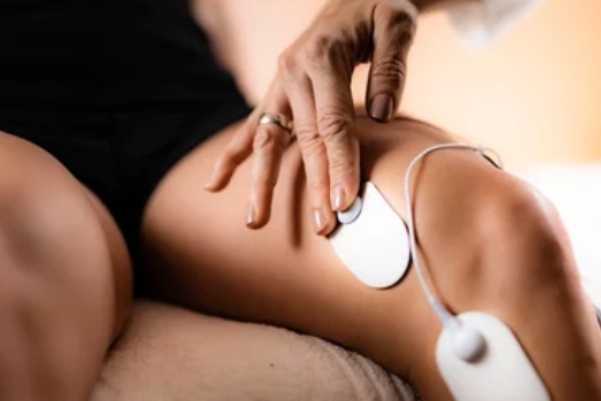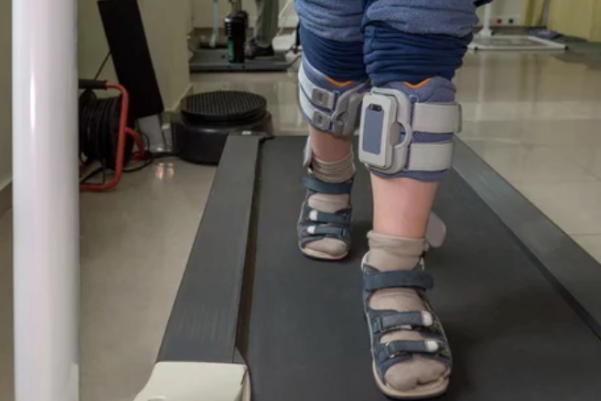TECHNOLOGY AND ADVANCE THERAPEUTICS
Functional Electrical Stimulation
Functional Electrical Stimulation (FES) uses electrical currents to stimulate muscles, aiding movement and function in neurological conditions for rehabilitation.

Functional Electrical Stimulation (FES) in Neurorehabilitation
Functional Electrical Stimulation (FES) stands as a groundbreaking therapeutic approach in the field of neurorehabilitation, offering renewed hope and opportunities for individuals with neurological impairments to regain function and independence. In this comprehensive overview, we delve into the essence of FES, its pivotal role in neurorehabilitation, and the various types of FES modalities shaping the landscape of rehabilitation therapy.

What is Functional Electrical Stimulation (FES)?
Functional Electrical Stimulation (FES) is an innovative therapeutic technique that harnesses electrical impulses to activate specific muscles or nerves, aiming to restore or improve motor function in individuals with neurological conditions or musculoskeletal impairments. By delivering controlled electrical stimulation to targeted areas, FES can elicit muscle contractions, facilitate movement patterns, and promote functional recovery.
Uses of Functional Electrical Stimulation in Neurorehabilitation
Functional Electrical Stimulation (FES) holds diverse applications in neurorehabilitation, serving as a valuable tool in the management and treatment of various neurological conditions, including:
STROKE REHABILITATION
FES can aid in the recovery of motor function and mobility in stroke survivors by stimulating weakened or paralyzed muscles, facilitating movement initiation, and promoting muscle re-education. It can help improve walking ability, upper limb function, and overall independence in activities of daily living.
SPINAL CORD INJURY (SCI)
Individuals with spinal cord injuries may benefit from FES therapy to enhance muscle strength, assist with standing and walking, and improve bladder and bowel function. FES can activate paralyzed muscles and promote neuromuscular re-education, leading to improved motor control and functional outcomes.
MULTIPLE SCLEROSIS (MS)
FES can be used to manage symptoms of multiple sclerosis, such as muscle weakness, spasticity, and gait disturbances. By stimulating muscle activation and improving muscle coordination, FES can enhance mobility, reduce fatigue, and improve overall quality of life in individuals living with MS.
CEREBRAL PALSY (CP)
FES holds promise in the treatment of cerebral palsy, a neurological disorder characterized by motor impairments and muscle weakness. FES can help improve muscle strength, range of motion, and motor control, enabling individuals with CP to participate more actively in therapy and daily activities.
TRAUMATIC BRAIN INJURY (TBI)
FES therapy can aid in the rehabilitation of individuals with traumatic brain injury by promoting muscle activation, improving motor function, and facilitating gait training. FES may also help reduce muscle atrophy and prevent secondary complications associated with prolonged immobilization.
Types of Functional Electrical Stimulation
Functional Electrical Stimulation (FES) encompasses various modalities and approaches tailored to address specific therapeutic goals and patient needs. Some common types of FES include:
- Surface FES: Surface FES involves placing electrodes on the skin over targeted muscles, delivering electrical impulses to induce muscle contractions or activate specific movement patterns.
- Implantable FES: Implantable FES systems require surgical implantation of electrodes directly onto or within the muscle tissue or nerves, allowing for more precise and selective stimulation of motor units.
- Hybrid FES: Hybrid FES systems combine surface and implantable electrodes to provide customized stimulation patterns and optimize functional outcomes in individuals with complex neuromuscular impairments.
Best Physiotherapy Center in Delhi
where technology meets with holistic hands-on-therapy.
At our facility is has Best Physiotherapist in Delhi we believe in a holistic approach to rehabilitation and wellness. We offer a range of services, including sports injury rehabilitation, chronic pain management, post-operative rehabilitation, and more.
Our team also provides education and guidance to help patients manage their conditions and prevent future injuries.
Call Today
+91-9818911195 +91-9818910029









